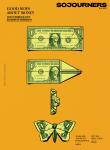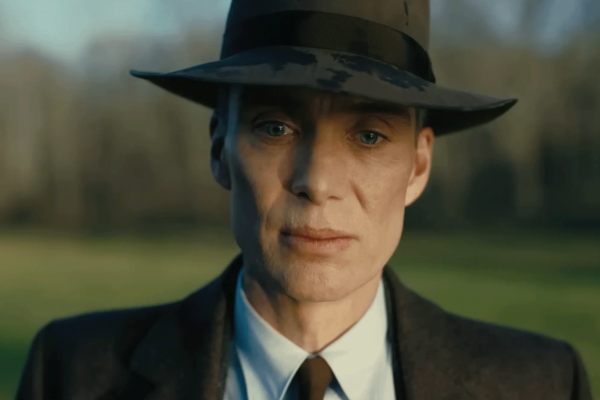IN CHRISTOPHER NOLAN'S film Oppenheimer, J. Robert Oppenheimer (Cillian Murphy) gives a speech to his assembled Manhattan Project team in Los Alamos, N.M., shortly after the U.S. drops an atomic bomb on Hiroshima, Japan, in early August of 1945. In a small auditorium in this town built for the sole purpose of developing the bomb, Oppenheimer looks over a crowd of ecstatic scientists and their families, who greet him with cheers. Some of them are waving American flags.
As Oppenheimer starts praising the team and what their great achievement means for the U.S., we’re given a window into his internal torment: The background starts to blur and vibrate. We hear a child’s scream. Oppenheimer sees a woman’s face start to flake away. Looking down, a charred human body clings to his leg. Oppenheimer sweats. He swallows. He continues speaking, but it’s clear he’s dissociated from the speech he’s written.
Oppenheimer is a biopic about the father of the atomic bomb. However, its philosophical interests run deeper. Nolan is clear that the human tendency toward destruction (or sin) is unavoidable. Given that, we’re left with many questions applicable to our lives as people of faith. If peace is secured through “mutually assured destruction,” is it really peace? What responsibility do we have to people who hurt or oppress us? If you architect a catastrophic weapon in hopes that its mere existence will be enough to scare off your enemies, how much blood is on your hands if that weapon is used?
Nolan’s film doesn’t answer those questions (with a subject as significant as the atomic bomb, perhaps no earthly answer would be sufficient). It does, however, present Oppenheimer’s experience as an example of how others have answered them — and the enduring consequences of their answers.
The film depicts the Manhattan Project’s genesis in response to Nazi attempts to develop an atomic bomb. Oppenheimer is initially enthusiastic about creating the bomb before the Nazis do. However, as a scientist, Oppenheimer knows the ramifications of a weapon like this. He expects the bomb will never be detonated — just dangled as a threat. Only later, when a general informs him that using the bomb on Japan is necessary to end the war and “save lives,” do we see the realization dawn on his face. “I feel I have blood on my hands,” Oppenheimer later tells President Harry Truman (Gary Oldman), who dismisses the statement by handing him a handkerchief to wipe off that theoretical blood.
It may seem naive from a modern perspective to believe the U.S. would never drop the bomb. However, we live in a world that bomb created. Oppenheimer argues that detonating the bomb was like opening Pandora’s box: It changed our worldview permanently. No wonder Oppenheimer is sweating in that auditorium; he’s not just feeling the weight of what his work has wrought. He’s also seeing the future it will generate.

Got something to say about what you're reading? We value your feedback!






